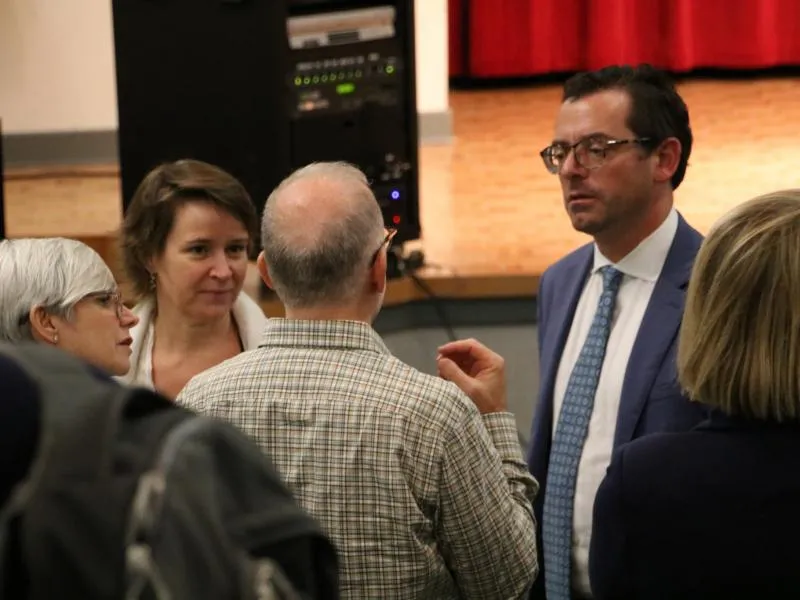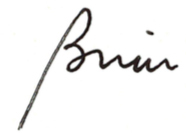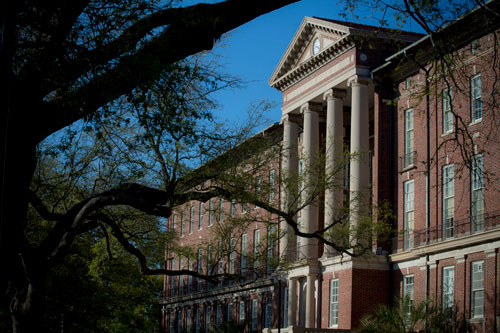
Earlier this month, I had the opportunity to address four different groups about my vision for the liberal arts—all in one day! The confluence of Tulane homecoming, reunions, family weekend, the first meeting of my Dean’s Advisory Council (DAC), and across town, the annual meeting of humanities councils meant SLA was getting a lot of attention. It was, to be honest, both an exhilarating and exhausting day.
The topics were slightly different, but they overlapped. To the DAC, I presented my progress in my first months as dean and vision for the future of the school. At a large lunch reception for alumni, I joined Tulane’s three other new deans on stage for a public interview with President Mike Fitts. Then I rushed across campus to Dixon Hall to give a lecture on the liberal arts to an audience of parents, alumni, and faculty. Finally, I sped downtown to the Mahalia Jackson Theater to address an audience of leaders at the National Humanities Conference about Tulane’s deep commitment to public humanities.
So what was the common theme? As I told the audience at Dixon Hall, I wanted to take the opportunity to discuss the reasons for studying the liberal arts at a moment when so many around the country—whether in state legislatures or at family gatherings—challenge its value.
I outlined both traditional and newer justifications for a liberal arts education. The traditional defense of a liberal education (the word “arts” was not always included) was that an understanding of the history, cultural expression, politics, and societies of the world made better citizens, able to judge for themselves how they wanted to govern themselves or be governed. At a time when truth itself is questioned and inquiry publicly challenged, this traditional defense of the liberal arts still holds, and indeed seems ever more pertinent.
An alternate traditional argument was that a liberal arts education is enriching in unpredictable ways, and that as students find passions in unexpected places—the course in ancient Greek civilization, the seminar on Caribbean literature, the art history survey, the economics class on education and inequality—their lives were made more profound. Their careers, in turn, might take pathways they never would have had they followed a narrow track.
But what does this mean for getting a job, parents and students rightly ask?
Here both traditional and new understandings of the value of a liberal education come into play. For decades, the idea that an education that compares and contrasts the way different disciplines approach and understand the world is the best training in how to think and learn—preparation for an ever-changing world and careers that could not be taught in classrooms because they were new or changed so quickly.
We might think of this as education in complexity itself. In professions from high finance to politics to social activism, the speed of change is unprecedented. The digital revolution has had profound effects on every profession and activity, and being in the middle of it means an ever-changing sense of what it means to be an individual in the world. As we seek to prepare our students—and ourselves—for new global arrangements, an inquiry into other societies past and present may, paradoxically, be the best education for the future.
Opportunities that students might not otherwise see, whether exploring innovative ways to engage artificial intelligence or how best to communicate with a constituency in a political campaign, emerge from creative and supple minds that have learned to grapple with complexity. And that may come from reading and speaking a complex Ancient language, wrapping your mind around the mores of a society that has ceased to exist, choreographing a troupe of dancers, or bringing economic analysis together with social policy.
The world will be led, I argued in Dixon Hall, by those who can understand systems, cultural complexity, what it means to inhabit another body, and our relations with each other and technology. And that may not be so far from the more traditional pleasures of a liberal arts education, which frequently emerge from just that sense of discovery and surprise that deep learning provokes.
This installment of our digital newsletter embraces some of the massive range in the liberal arts that we cherish. As we move between pieces on the relationship between digital media and politics in Brazil, to environmental historian Andy Horowitz’s discussion of how his interest in the paradox of wilderness and extractive enterprises lead him to visit a post-industrial landscape in the Alaskan hinterland, the geographies are distant. Perhaps the most apt phrase comes from Emily Wilkerson’s interview with drummer Tony Allen, in which the master musician describes how collaboration is “mingling with other people’s minds.” That is both a wonderful description of Afrobeat and jazz improvisation and the value of a liberal arts education itself.

Read more from the SLA November 29, 2018 Newsletter.
